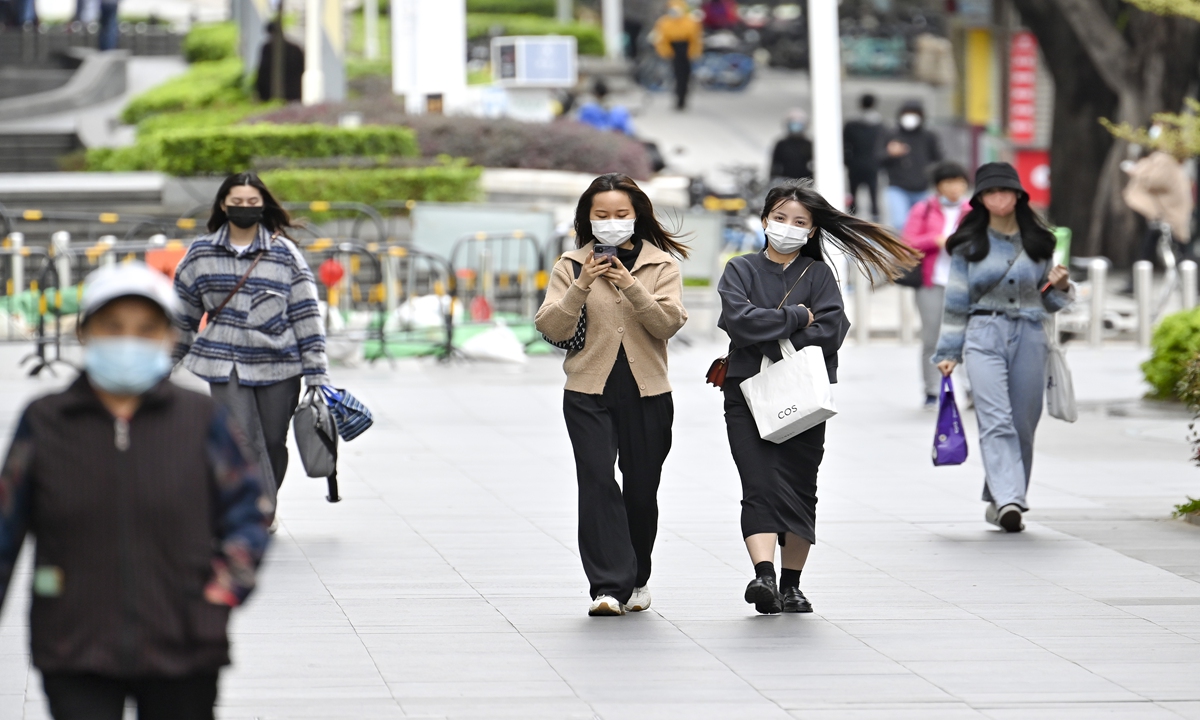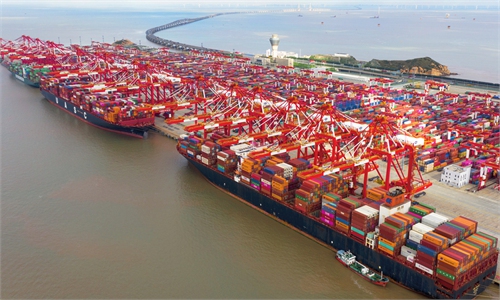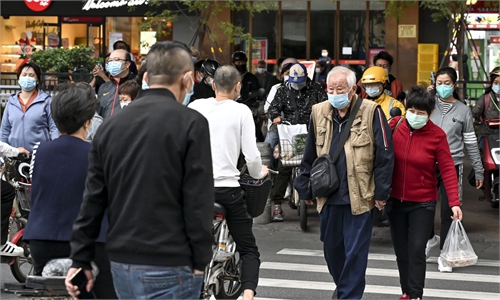Chinese cities further optimize epidemic response amid ‘consistent strategy, flexible measures’ in face of weakening Omicron

Residents wearing face masks on a street in Guangzhou in South China's Guangdong Province on Thursday. Several districts in Guangzhou have lifted temporary restrictions. Photo: VCG
Chinese cities including Beijing, Guangzhou and Chengdu have continued to optimize anti-epidemic policies in accordance with the newly released 20 prevention and control measures, with businesses resuming and temporary restrictions being lifted in a managed way. Chinese Vice Premier Sun Chunlan on Wednesday underlined the importance of continually optimizing the country's response to COVID-19.
The Central Committee of the Communist Party of China and the State Council have always put public health and safety first, and effectively dealt with uncertainty linked to the epidemic with a consistent strategy and flexible measures, Sun said. China is facing a new situation and new tasks in epidemic prevention and control as the Omicron virus pathogenicity weakens, and the country has seen high rates of vaccination and is now more experienced in managing the virus, Sun said.
Sun urged efforts to further optimize the COVID-19 response, improve diagnosis, testing, treatment and quarantine measures, strengthen vaccination rates, particularly for the elderly, and speed up the preparation of medications and other medical resources.
Several districts in Beijing have announced that people who stay at home and don't need to go to public places can now opt not to take daily nucleic acid tests, an approach designed to achieve a more precise way to reduce spreading risks and also conserving resources.
Multiple shopping centers in the Chinese capital also announced that they are reopening from Thursday. Raffles City Beijing in Dongcheng district and Longhua Outlet in Shunyi district announced on Wednesday that they would be open from Thursday and that patrons would need to present a negative nucleic acid test result taken within 48 hours when entering the shopping centers.
Heshenghui in Chaoyang district resumed delivery services for restaurants and supermarkets from Thursday, while several other shopping centers in Haidian, Changping and Pinggu districts had already restored operations as of late November.
Across November, Beijing reported more than 30,000 locally transmitted cases, Jiankang Shibao reported, further noting that asymptomatic cases appeared to be on the decline.
Along with Beijing, several districts in Guangzhou, capital of South China's Guangdong Province, on Wednesday issued notices on optimizing anti-COVID-19 measures including lifting temporary restrictions, adjusting risk regions' classification, and resuming on-site classes, according to the Guangzhou Health Commission. Some regions in Guangzhou also resumed dine-in services, and residents only need to show the health code and don't need to present negative nucleic acid testing reports taken when entering some shopping malls.
In Southwest China's Chongqing Municipality, residents in communities which did not report a positive case for five days don't need to participate in the latest round of mass nucleic acid testing, the local authorities said earlier. The rapid rise of the cases has been effectively contained, and the situation is stabilizing, local officials said during a Wednesday press briefing.
Shopping malls, barbershops and other essential businesses can be gradually reopened to the public. Some entertainment venues with large inside gathering will remain suspended to reduce risk, according to the Chongqing authorities. The screening scope of close contacts should not be expanded arbitrarily, and the criteria for determining close contacts should not be simply based on proximity, authorities added.
Similar policies have also been announced in other major Chinese cities such as Shenzhen and Chengdu. Shenzhen authorities said that the restriction should be lifted in a timely manner if the conditions allow and called for precise classification of designated high-risk regions. Close contacts shall be placed under centralized quarantine in principle, and those who meet the conditions for home quarantine shall be placed at home, according to the authorities.
In Chengdu, Southwest China's Sichuan Province, residents are now only required to show their health code and don't need to present nucleic acid test negative reports before entering their communities. Although residents still need to present 24-hour negative report before entering entertainment venues and a 72-hour report is needed before entering other public venues including supermarkets.
The central urban area of Shijiazhuang in North China's Hebei Province also announced on Wednesday the resumption of much of daily life starting from Thursday.


